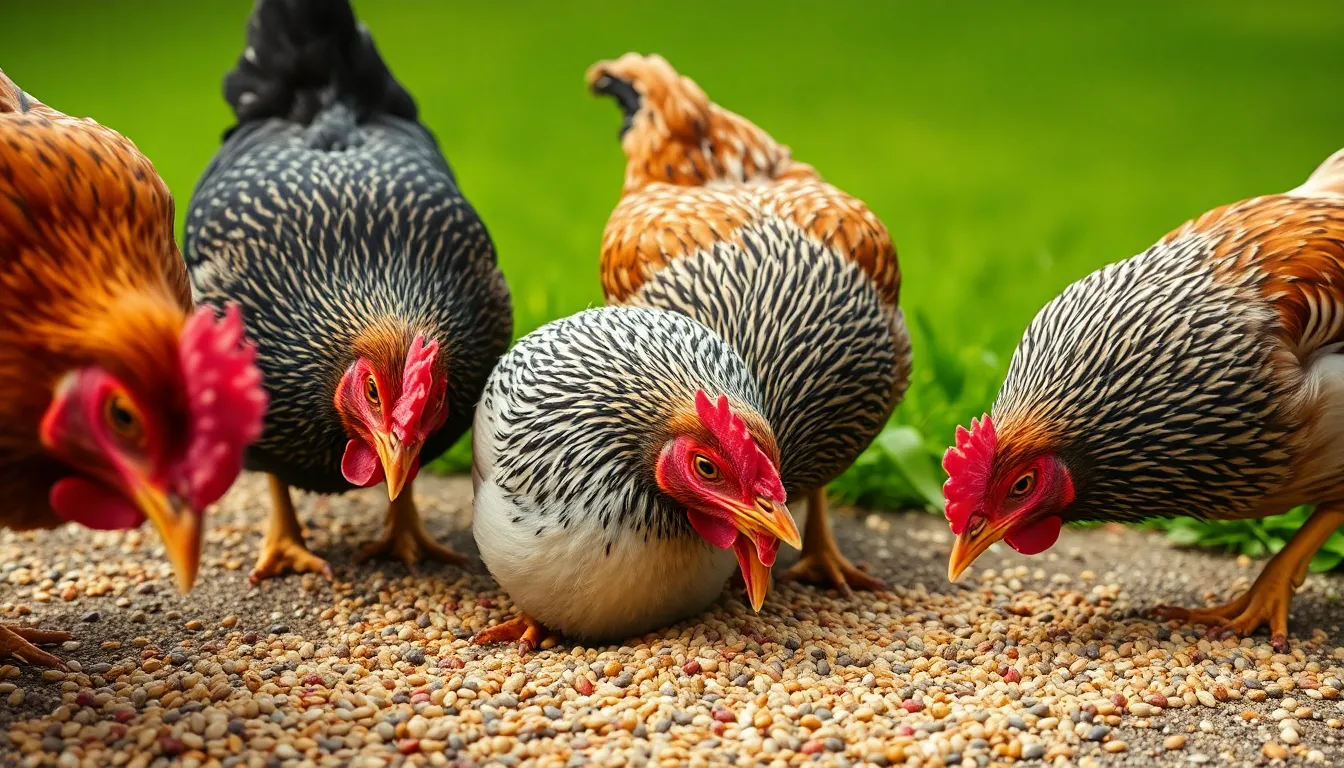Chickens are the feathered foodies of the farm world, always on the lookout for their next tasty treat. But when it comes to chia seeds, the tiny superfood that’s taken the health world by storm, many chicken owners are scratching their heads. Can these little seeds really be part of a chicken’s diet? Spoiler alert: they can!
Table of Contents
ToggleOverview of Chia Seeds
Chia seeds are small, oval seeds from the Salvia hispanica plant, native to Mexico and Guatemala. These seeds contain a high concentration of omega-3 fatty acids, fiber, and protein. About 28 grams of chia seeds provide 138 calories, 4.7 grams of protein, and 9.8 grams of fat, making them nutritious.
Calcium, magnesium, and antioxidants also appear in chia seeds. These nutrients contribute to overall health and support immune function. Many individuals incorporate chia seeds into their diets for added health benefits.
Chickens benefit from chia seeds as a source of nutrients. When chickens consume these seeds, it enhances their diet variety and nutrient intake. Feeding chickens chia seeds can potentially improve their egg production and quality. With the right quantity, they can safely enjoy chia’s numerous benefits.
Efforts to add chia seeds to a chicken’s diet have gained popularity among poultry owners. Consulting with a veterinarian about the appropriate portion sizes ensures that chickens enjoy chia in moderation. Whether mixed with grains or sprinkled in their feed, chia seeds can easily enrich chickens’ diets. Incorporating this superfood supports their health and vigor.
Research shows that chia seeds may help promote healthy digestion in chickens. Adding these seeds can assist in maintaining gut health. Therefore, integrating chia seeds as a supplemental food can lead to happier and healthier chickens.
Nutritional Benefits of Chia Seeds for Chickens

Chia seeds offer numerous health benefits for chickens. These tiny seeds enhance the overall nutrient profile of their diet.
Essential Nutrients in Chia Seeds
Chia seeds provide essential nutrients crucial for chickens. Rich in omega-3 fatty acids, they promote heart health and support immune function. Protein content boosts muscle development and feather quality. Additionally, fiber aids in digestion and helps maintain gut health. Calcium and magnesium contribute to strong bones and shell quality in eggs. Antioxidants in chia seeds combat oxidative stress, enhancing overall vitality. Feeding these seeds ensures a balanced intake of necessary micronutrients.
Digestibility and Absorption
Chickens find chia seeds easily digestible, which enhances nutrient absorption. When soaked in water, seeds expand, making them more accessible for digestion. This efficient process allows chickens to absorb omega-3 fatty acids and other nutrients effectively. Additionally, chia seeds contain soluble fiber, which promotes healthy gut flora. This healthy gut environment further supports nutrient absorption, enhancing overall well-being. Regular incorporation of chia seeds into their diet leads to improved digestion and nutrient uptake in chickens.
Potential Risks of Feeding Chia Seeds to Chickens
Feeding chia seeds to chickens carries potential risks that owners should consider. Awareness of these risks enables more informed dietary decisions for poultry.
Allergic Reactions
Chickens can experience allergic reactions to chia seeds, though such instances remain rare. Symptoms may include digestive discomfort or skin irritations. Monitoring chickens closely after introducing chia seeds is crucial to identify any adverse effects quickly. Not all chickens react the same way to new foods. Owners should consult a veterinarian if signs of allergies arise, ensuring the well-being of their flock.
Overconsumption Concerns
Overconsumption of chia seeds poses risks, primarily due to their high fiber content. Excessive fiber intake can lead to digestive issues such as diarrhea or bloating. Portion control plays a vital role in preventing these problems. Sticking to appropriate serving sizes helps maintain balance in a chicken’s diet. Typically, chia seeds should account for no more than 10% of total feed to avoid adverse effects, ensuring chickens benefit without facing risks.
How to Introduce Chia Seeds to Chickens
Introducing chia seeds into a chicken’s diet requires careful consideration. Gradual incorporation ensures that chickens adjust well to this new superfood.
Recommended Serving Sizes
Recommended serving sizes for chia seeds should align with established guidelines. Portion control is crucial; chia seeds should constitute no more than 10% of a chicken’s total feed. For example, if a chicken consumes 1 pound of feed daily, a maximum of 1.6 ounces of chia seeds suffices. By adhering to these recommendations, owners can support their chickens’ health without risking digestive issues.
Best Practices for Feeding
Best practices for feeding chia seeds involve methods that enhance digestibility. Soaking seeds in water prior to feeding makes nutrients more accessible, benefiting overall health. Mixing chia seeds with grains or incorporating them into the regular feed encourages consumption. Observing chickens closely during this transition phase is vital; owners should monitor for any adverse reactions. Regular check-ins allow adjustments to serving sizes or feeding methods, ensuring a positive experience for the chickens.
Chia seeds can be a valuable addition to a chicken’s diet when introduced properly. Their rich nutrient profile supports overall health and enhances egg production while promoting healthy digestion. However, moderation is key to avoid potential digestive issues. Monitoring chickens for any adverse reactions after introducing chia seeds is crucial for their well-being. By incorporating these tiny superfoods thoughtfully, chicken owners can provide a balanced diet that boosts their flock’s health and vitality.





